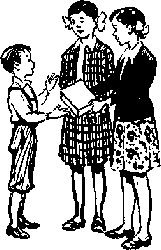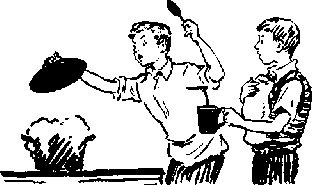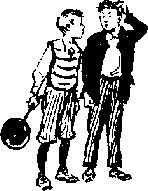THE QUEEN OF SPADES
by Alexander Pushkin
The Queen of Spades means secret hostility.
A New Book on Fortunetelling.
CHAPTER I
They together would meet
To play.
Lord, forgive them their sin:
Gambling, late to win
They’d stay.
They won and they lost,
And put down the cost
In chalk.
So on cold autumn days
They wasted no time
In talk.
‘How have you been doing, Surin?’ Narumov asked.
‘Losing, as usual. I must confess, I have no luck: I play cautiously, never get excited, never lose my head, and yet I go on losing!’
‘And you ‘ve never been carried away? Never risk a high stake? I marvel at your self-control.’
‘But look at Hermann!’ said one of the visitors, pointing to a young engineer; ‘he has never held a card in his hands, never staked a penny on one, and yet he sits with us till five o’clock in the morning watching us play.’
‘I am very much interested in cards,’ Hermann said, ‘but I am not in a position to sacrifice the essential in the hope of acquiring the superfluous.’
‘Hermann is a German; he is prudent—that’s all!’
Tomsky remarked. ‘ But the person I really can’t understand is my grandmother, Countess Anna Fedorovna.’
‘How ‘s that?’ the guests cried.
‘I cannot conceive why my grandmother does not play,’ Tomsky went on.
‘But surely there ‘s nothing wonderful in an old lady of eighty not gambling?’ Narumov said.
‘So you know nothing about her?’
‘No! We certainly don’t.’
‘Oh, then listen! I must tell you that some sixty years ago my grandmother went to Paris and was very popular there. People ran after her to catch a glimpse of la Vénus moscovite; Richelieu paid his addresses to her, and grand-mamma assures me that he very nearly shot himself through her cruelty. In those days ladies used to play faro. One day at the court she lost a very big sum to the Duke of Orleans. When she came home she told her husband about her loss while untying her farthingale, and taking off her beauty spots, and ordered him to pay her debt. My grand-father, so far as I remember, was a kind of butler to my grandmother. He was terrified of her; and yet when he heard of such a fearful debt he lost his temper, fetched the bills they owed and, proving to her that they had spent half a million in six months, and had neither their Moscow nor their Saratov estate near Paris, flatly refused to pay. Grandmamma gave him a box on the ear, and went to bed alone as a sign of her displeasure. The following morning she sent for her husband, hoping that these homely measures had had an effect on him, but found him as firm as ever. For the first time in her life she went so far as to reason with him and explain; she tried to put him to shame, pointing out with condescension that there were debts and debts, and that there was a difference between a prince and a coach-builder. But it wasn’t a bit of good! Grandpapa was in open revolt. ‘No’—and that was the end of it. Grandmamma did not know what to do. She counted among her intimate friends a very remarkable man. You have heard of Count St. Germain, of whom they tell so many marvels. You know that he claimed to have lived for centuries, to have invented the elixir of life and the philosopher’s stone, and so on. People laughed at him as a charlatan, and Casanova says in his Memoirs that he was a spy; but in spite of his mysterious ways St. Germain looked a perfect gentleman, and had a very pleasant manner. Grandmamma is still devoted to him, and gets angry if any one speaks of him with disrespect. Grandmamma knew that St. Germain had plenty of money. She decided to appeal to him, and wrote a note asking him to come to her at once. The eccentric old man came immediately, and found her in terrible distress. She described in the blackest colours her husband’s barbarity, and said at last that she rested all her hopes on his friendship and kindness. St. Germain pondered.
‘I could provide you with that sum,’ he said,’ but I know you wouldn’t be happy till you paid me, and I don’t like to cause you fresh worry. There ‘s another way: you can win it back.’ ‘But, dear Count,’ grandmamma replied, ‘I tell you I have no money at all.’ ‘It’s not a case of money,’ St. Germain replied; ‘ please listen to what I ‘m going to tell you.’ And he revealed to her a secret which every one of us would give a great deal to know. . . .’
The young gamblers redoubled their attention. Tomsky lighted his pipe, and taking a pull at it, continued: ‘That very evening grandmamma appeared at Versailles, at the jeu de la reine. The Duke of Orleans kept the bank; grand- mamma made a slight apology for not having brought the money, and telling some little story to excuse herself, began playing against him. She selected three cards and played them one after the other: all three won, and she retrieved her loss completely.’
‘Accident!’ said one of the guests.
‘A fairy tale,’ remarked Hermann. ‘Marked cards, perhaps,’ a third chimed in.
‘I don’t think so,’ Tomsky replied impressively.
‘What!’ said Narumov,’ you have a grandmother who can guess three cards in succession and you haven’t leamt her secret yet?’
‘Learnt it, indeed!’ Tomsky replied; ‘she had four sons, one of whom was my father; all four were desperate gamblers, but she did not reveal her secret to one of them, though it wouldn’t have been a bad thing for them, or even for me. But this is what my Uncle Count Ivan Ilyitch told me, assuring me on his honour that it was true. Tchaplitsky, you know, the one who died a beggar after squandering millions, as a young man once lost three hundred thousand, to Zoritch if I remember rightly. He was in despair. Grand-mamma was always severe on young men’s follies, but somehow she took pity on Tchaplitsky. She gave him three cards, which he was to play one after another, and made him promise on his honour never to play again. Tchaplitsky went to Zoritch’s; they sat down to play. Tchaplitsky staked fifty thousand on his first card and won; doubled his stake and won; did the same again, won back his loss, and had something left him into the bargain. . . .’
‘I say, it’s time to go to bed; it’s a quarter to six.’ It was daylight indeed. The young men emptied their glasses and went home.
CHAPTER II
‘Que voulez-vous, madame? Elles sont plus fraîches.’
A Society Conversation.
‘Good morning, grand’maman,’ said a young officer, coming in. ‘Bon jour, mademoiselle Lise. Grand’maman, I have a favour to ask of you.’
‘What is it, Paul?’
‘Allow me to introduce to you a friend of mine and to bring him to your ball on Friday.’
‘Bring him straight to the ball and introduce him to me then. Were you at the N.s’ last night?’
‘Of course! It was very enjoyable; we danced till five in the morning. Miss Yeletsky looked perfectly charming.’
‘Come, my dear! What do you see in her? She isn’t a patch on her grandmother. Princess Darya Petrovna! By the way, I expect Darya Petrovna is looking much older, isn’t she?’
‘How do you mean; looking much older?’ Tomsky answered absent-mindedly. ‘ She ‘s been dead for the last seven years.’
The young lady raised her head and made a sign to the young man. He bit his lip, recalling that they concealed from the Countess the deaths of her old friends. But the Countess heard the news with the utmost indifference.
‘Dead! I didn’t know,’ she said. ‘We were maids of honour together, and as we were being presented, the Empress . . .’
And for the hundredth time the Countess told the anecdote to her grandson.
‘Well, Paul, now help me to get up,’ she said afterwards. ‘Lizanka, where is my snuff-box?’
And the Countess went behind the screen with her maids to finish dressing. Tomsky was left with the young lady.
‘Whom is it you want to introduce?’ Lizaveta Ivanovna asked quietly.
‘Narumov. Do you know him?’
‘No! Is he in the army?’
‘Yes.’
‘In the Engineers?’
‘No, he is in the Horse Guards. What made you think he was in the Engineers?’
The young lady laughed and made no answer.
‘Paul!’ the Countess called from behind the screen. ‘Send me some new novel, only please not a modern one.’
‘How do you mean, grand’maman?’
‘I mean, a novel in which the hero does not strangle his father or mother and there are no drowned corpses. I am terribly afraid of them.’
‘There are no such novels nowadays. But perhaps you would like a Russian novel?’
‘Are there any Russian novels? Send me one, my dear, please do!’
‘Excuse me, grand’maman, I am in a hurry. . . . Good-bye, Lizaveta Ivanovna! What made you think, then, that Narumov was in the Engineers?’
And Tomsky went away.
Lizaveta Ivanovna was left alone; she abandoned her work and looked out of the window. Soon a young officer came from behind a corner-house on the other side of the road. Colour came into her cheeks; she took up her work again, bending low over the embroidery. At that moment the Countess came in, fully dressed.
‘Order the carriage, Lizanka,’ she said, ‘and let us go for a drive.’
Liza got up from her embroidery frame and began putting away her work.
‘What’s the matter with you, my dear? Are you deaf?’ the Countess shouted. ‘Be quick and order the carriage.’
‘Certainly,’ the young lady answered quietly, and ran to the hall.
A servant came in, and gave the Countess a parcel of books from Prince Pavel Alexandrovitch.
‘Good, thank him,’ the Countess said. ‘ Lizanka, Lizanka, where are you off to?’
‘To dress.’
‘There’s plenty of time, my dear. Stay here. Open the first volume and read to me.’
The girl took the book and read a few lines.
‘Louder!’ the Countess said. ‘What’s the matter with you, my dear? Have you lost your voice, or what? Wait a minute . . . give me the footstool. Bring it nearer. . . . Well?’
Lizaveta Ivanovna read two more pages. The Countess yawned.
‘Leave off,’she said. ‘ What rubbish it is! Send the books back to Prince Pavel with my thanks. . . . What about the carriage?’
‘The carriage is ready,’ said Lizaveta Ivanovna, peeping out into the street.
‘And why aren’t you dressed?’ the Countess said. ‘One always has to wait for you. It’s too much of a good thing, my dear.’
Liza ran to her room. Two minutes had not passed when the Countess began ringing violently. Three maids rushed in at one door and a footman at the other.
‘Why don’t you come when you are called?’ the Countess said to them. ‘Tell Lizaveta Ivanovna that I am waiting.’
Lizaveta Ivanovna came in, wearing a hat and a pelisse.
‘At last, my dear!’ the Countess said. ‘What finery What is it for? For whose benefit? And what is the weather like? I believe it’s windy.’
‘No, madam,’ the footman replied. ‘There ‘s no wind at all.’
‘You say anything that comes into your head! Open the window! I thought so: there ‘s a wind, and a very cold wind, too! Unharness the horses! Lizanka, we aren’t going: you needn’t have dressed after all.’
‘And this is my life!’ Lizaveta Ivanovna thought.
Indeed, she had a wretched time of it. Bitter is the bread of others, said Dante, and hard the steps of another man’s house; and who should know the bitterness of dependence better than a poor orphan brought up by a rich and worldly old woman? The Countess certainly was not bad-hearted, but she was capricious as a woman spoiled by society, stingy, and sunk into cold egoism like all old people who have done with love and are out of touch with the life around them. She took part in all the vanities of the fashionable world;
she went to dances, where she sat in a corner, rouged and dressed up in the ancient fashion like some hideous but indispensable ornament of the ball-room. The guests, on arriving, went up to her with low bows, as though carrying out an old-established rite, and after that no one took any notice of her. She received the whole town at her house, observing a strict etiquette and not recognizing any of her guests. Her numerous house-serfs, grown fat and grey in her entrance hall and the maids’ room, did what they liked, and vied with one another in robbing the decrepit old woman. Lizaveta Ivanovna was the domestic martyr. She poured out tea and was reprimanded for wasting sugar; she read novels aloud, and was blamed for all the author’s mistakes; she accompanied the Countess on her drives— and was responsible for the state of the roads and the weather. She was supposed to receive a salary, which was never paid her in full, and yet she was expected to be as well dressed as every one else—that is, as the very few. She played a most pitiable part in society. Every one knew her and no one noticed her; at balls she danced only when someone was short of a partner, and ladies took her arm each time they wanted to go to the cloak-room to put something right m their attire. She was proud, she keenly felt her position and looked about her waiting impatiently for someone to rescue her; but the young men, vain and calculating in their very frivolity, did not deign to notice her, though Lizaveta Ivanovna was a hundred times more charming than the cold and insolent heiresses on whom they danced attendance. Many times, leaving quietly the dull and sumptuous drawing-room, she went to weep in her humble attic, where there was a paper-covered screen, a chest of drawers, a small mirror, and a painted bedstead, dimly lighted by a tallow candle in a copper candlestick.
One morning, two days after the evening described at the beginning of this story, and a week before the scene that has just been described—one morning Lizaveta Ivanovna, sitting at her embroidery frame by the window had happened to glance into the street. She saw a young officer in the Engineer’s uniform who stood gazing at her window. She bent over her work again; five minutes later she looked out once more—the young man was standing on the same spot. Not being in the habit of flirting with passers-by, she looked out no more and worked for a couple of hours without raising her head. Dinner was served. She got up to put away her embroidery frame and, glancing casually into the street, saw the officer again. It struck her as rather strange. After dinner she went up to the window feeling somewhat uneasy, but the officer was no longer there, and she forgot about him. . . .
A couple of days later she saw him again as she was leaving the house with the Countess. He was standing by the front door, his face hidden by his beaver collar; his black eyes gleamed from under his hat. Lizaveta Ivanovna felt alarmed, she did not know why, and stepped into the carriage indescribably agitated.
When she came home she ran to the window—the officer was standing in the same place, his eyes fixed on her; she walked away, consumed with curiosity and excited by a feeling entirely new to her.
Since then not a day had passed without the young man appearing at a certain hour before the windows of their house. A contact had arisen between them of itself, as it were. Sitting in her usual place at work she felt his approach —and, lifting her head, looked at him longer and longer every day. The young man seemed to be grateful to her for it: with the keen eyes of youth she saw a flush overspread his pale cheeks every time their eyes met. Before the end of the week she had smiled at him.
When Tomsky asked the Countess’s permission to introduce a friend of his, the poor girl’s heart beat fast. But hearing that Narumov was in the Horse Guards and not in the Engineers, she was sorry, by an indiscreet question, to have betrayed her secret to a thoughtless man like Tomsky.
Hermann was the son of a German who had settled in Russia and left him a small fortune. Firmly convinced that he must secure his independence, Hermann did not touch even the interest, but lived on his pay without indulging in the slightest extravagance. But since he was reserved and ambitious his friends rarely had occasion to laugh at his being too careful with his money. He had strong passions and an ardent imagination, but strength of character saved him from the usual vagaries of youth. Thus, for instance, though a gambler at heart, he never touched cards, having decided that his means did not allow him (as he put it) to sacrifice the essential in the hope of acquiring the superfluous —and yet he spent night after night at the gambling tables watching with a feverish tremor the vicissitudes of the game.
The story about the three cards greatly affected his imagination and haunted his mind all night. ‘What if,’ he thought the following evening as he wandered about Petersburg, ‘what if the old Countess revealed her secret to me? or told me the three winning cards? Why shouldn’t I try my luck? … be introduced to her, win her favour, become her lover, perhaps; but then all this takes time, and she is eighty-seven, she may die in a week, in a couple of days! And, the story itself … is it likely? No! economy, calculation, and hard work—those are my three winning cards, that’s what will increase my capital threefold, sevenfold, and secure me leisure and independence!’ Arguing in this way he found himself in one of the main streets of Petersburg in front of a house of old-fashioned architecture The street was crowded with carriages which, one after another, drove up to the lighted porch. Every minute the shapely ankle of a young beauty, a military boot with a clinking spur, or a diplomat’s striped stocking and shoe appeared on a carriage step. Fur coats and cloaks flitted past the majestic looking porter. Hermann stopped.
‘Whose house is that?’ he asked the policeman at the corner.
‘Countess X.’s,’ the policeman answered.
Hermann shuddered. The marvellous story came into his mind again. He walked up and down the street past the house, thinking of its owner and her wonderful faculty. It was late when he returned to his humble lodgings; he could not go to sleep for hours, and when at last sleep overpowered him lie dreamt of cards, of a green-baize-covered table, bundles of notes, and piles of gold. He played card after card, resolutely turning down the corners and won all the time, raking in the gold and stuffing his pockets with notes. Waking up rather late, he sighed at the loss of his fantastic wealth, and, setting out once more to wander about the town, found himself again opposite the Countess’s house. It was as though some mysterious power drew him to it. He stopped and gazed at the windows. In one of them he saw a dark-haired girl’s head, bent over a book or needle-work. The head was raised. Hermann saw a rosy face and black eyes. That moment decided his fate.
CHAPTER III
plus vite que je ne puis les lire.
A Correspondence.
‘What’s the matter with you, my dear? Are you asleep? Don’t you hear or understand what I ‘m saying? I speak distinctly enough, thank Heaven, and am not in my dotage yet!’
Lizaveta Ivanovna did not listen. When they came home she ran to her room and pulled the letter out of her glove; it was not sealed. She read it. It contained a declaration of love: it was respectful, tender, and had been taken word for word out of a German novel. But Lizaveta Ivanovna did not know German and was very much pleased with it.
And yet the letter troubled her greatly. It was the first time in her life that she had entered into intimate and secret relations with a young man. His presumption terrified her. She reproached herself for having behaved thoughtlessly and did not know what to do: ought she to give up sitting at the window, and by a show of indifference make the young officer less eager to pursue her? Ought she to return the letter? or to answer him coldly and resolutely? There was no one to advise her: she had neither a governess nor a girl friend. Lizaveta Ivanovna decided to answer the letter.
She sat down to a writing-table, took up a pen and a sheet of paper—and sank into thought. She began the letter more than once, and tore it up: the wording seemed to her either too lenient or too harsh. At last she succeeded in writing a few lines that pleased her. ‘ I am sure,’ she wrote, ‘that your intentions are honourable, and that you had no wish to wound me by your thoughtless action; but our acquaintance ought not to have begun in this manner. I return you your letter and hope that in the future I shall have no cause to complain of undeserved disrespect.’
When next day Lizaveta Ivanovna saw Hermann approach she got up from her embroidery frame, went into the next room and, opening the window, threw her letter into the street, trusting to the young officer’s agility. Running up, Hermann picked up the letter, and went into a confectioner’s shop. Tearing off the seal he found his own note and Lizaveta Ivanovna’s reply. It was just what he had expected, and he returned home very much interested in the affair.
Three days later a sharp-eyed young girl brought Lizaveta Ivanovna a letter from a milliner’s shop. Lizaveta Ivanovna opened it anxiously, thinking it was a bill, and suddenly recognized Hermann’s handwriting.
‘You have made a mistake, my dear,’ she said; ‘this note is not for me.’
‘Yes, it is!’ the bold girl answered without concealing a sly smile; ‘please read it!’
Lizaveta Ivanovna read the letter. In it Hermann begged her to meet him.
‘It cannot be,’ said Lizaveta Ivanovna, alarmed at the request coming so soon and at the means of transmitting it. ‘I am sure this was not addressed to me.’ And she tore the letter into little bits.
‘If the letter is not for you why did you tear it?’ the shop-assistant said. ‘I would have taken it back to the sender.’
‘Please, my dear,’ said Lizabeta Ivanovna, flushing crimson at her remark, ‘ don’t bring any more letters. And tell him who sent you that he should be ashamed of himself.’
But Hermann would not give in. Every day Lizaveta Ivanovna received a letter from him by one means or another. They were no longer translated from the German. Hermann wrote them inspired by passion, and in the style natural to him: they reflected the intensity of his desires and the disorder of an unbridled imagination. Lizaveta Ivanovna never thought of returning them now: she drank them in eagerly, and took to answering them—and her letters grew longer and more tender every hour. At last she threw out of the window the following note to him:
There is a ball to-night at the N. ambassador’s; the Countess will be there. We shall stay till about one o’clock. Here is an opportunity for you to see me alone. As soon as the Countess leaves, the servants will probably go to their quarters; the porter will be left in the hall, but he, too, usually goes to his room. Come at half-past eleven. Walk straight up the stairs. If you meet any one in the hall, ask if the Countess is at home. They will say no—and then there is no help for it, you will have to go home. But probably you will not meet any one. The maids all sit together in their room. Turn to the left from the hall and go straight on till you reach the Countess’s bedroom. In the bedroom, behind the screen, you will see two small doors: to the right, into the study where the Countess never goes; and to the left, into the passage with a narrow winding staircase in it; it leads to my room.”
Hermann waited for the appointed hour like a tiger for its prey. At ten in the evening he was already standing by the Countess’s house. It was a terrible night. The wind howled, wet snow fell in big flakes; the street lamps burned dimly;
the streets were empty. From time to time a sledge driver, looking out for a belated fare, went slowly by, urging on his wretched nag. Hermann stood there without his overcoat, feeling neither the wind nor the snow. At last the Countess’s carriage came round. He saw the old woman in a sable coat being lifted into the carriage by two footmen: then Liza in a light cloak, with fresh flowers in her hair, flitted by. The carriage door banged. The carriage rolled heavily over the wet snow. The porter closed the doors. The lights in the windows went out. Hermann walked up and down the road by the deserted house; going up to a street lamp he glanced at his watch: it was twenty past eleven. He stopped by the lamp-post, and waited for ten minutes, his eyes fixed on the hand of the watch. Precisely at half-past eleven Hermann walked up the steps of the house and entered the brightly lit hall. The porter was not there. Hermann ran up the stairs, and opening the nearest door saw a servant asleep under a lamp in a dirty old-fashioned arm-chair. Hermann walked past him with a light firm step. The dark reception rooms were dimly lit by the lamp in the hall. Hermann entered the bedroom. A golden sanctuary lamp was burning before the ikon-stand filled with ancient ikons. Arm-chairs upholstered in faded brocade and sofas with down cushions were ranged with depressing symmetry round the walls covered with Chinese wall-paper. Two portraits painted in Paris by Madame Lebrun hung on the wall. One was that of a stout, ruddy-cheeked man of about forty, in a light-green uniform with a star on his breast; the other was oi a. young beauty with an aquiline nose and a rose in her powdered hair, which was piled high up on her head. Every corner was crowded with china shepherdesses, clocks made by the famous Leroy, caskets, roulettes, fans, and various ladies’ toys invented at the end of the last century together with Montgolfier’s balloon and Mesmer’s magnetism. Hermann went behind the screen. A small iron bedstead stood there: to the right was the door into the study, to the left the door into the passage. Opening it Hermann saw a narrow spiral staircase that led to poor Liza’s room. But he returned and went into the dark study. The time passed slowly. Everything was quiet. The clock in the drawing-room struck twelve; the clocks in all the other rooms, one after the other, chimed twelve—and all was still again. Hermann stood leaning against the cold stove. He was calm; his heart was beating as evenly as that of a man who is determined on a dangerous but necessary course of action. The clock struck the first and then the second hour of the morning, and he heard the distant rumble of a carriage. In spite of himself he was overcome with agitation. The carriage drove up to the house and stopped. He heard the rattle of the step being lowered. There was commotion in the house. People ran to and fro, voices could be heard, lights were lit. Three old maid-servants ran into the bedroom, and the Countess, tired to death, came in and sank into an arm-chair. Hermann looked through a crack in the door. Lizaveta Ivanovna walked past him. He heard her hurried footsteps on the stairs leading to her room. Something like remorse stirred in his heart, but died down again. He seemed turned to stone. The Countess began undressing in front of the mirror. The maids took off her cap trimmed with roses; they removed the powdered wig from her grey, closely cropped head. Pins fell about her in showers. The silver-embroidered yellow dress fell at her swollen feet. Hermann witnessed the hideous mysteries of her toilet; at last the Countess put on a bed jacket and a nightcap; in that attire, more suited to her age, she seemed less terrible and hideous. Like all old people, the Countess suffered from sleeplessness. Having undressed, she sat down by the window in a big arm-chair and dismissed her maids. They took away the candles; the room was again lighted only by the sanctuary lamp. The Countess sat there, her face quite yellow, her flabby lips moving, her body rocking to and fro.
Her dim eyes showed a complete absence of thought; looking at her one might have imagined that the horrible old woman was moving not of her own will, but under the influence of some hidden galvanic power.
Suddenly an extraordinary change came over that dead face. Her lips ceased moving, her eyes brightened; a stranger was standing before her.
‘Don’t be alarmed, for Heaven’s sake, don’t be alarmed!’ he said in a low and clear voice. ‘I don’t mean to do you any harm, I have come to beg a favour of you.’
The old woman stared at him in silence, looking as though she had not heard him. Hermann thought she was deaf, and, bending right over her ear, repeated what he had just said. The old woman said nothing.
‘You can bring about my happiness,’ Hermann went on, ‘and it will cost you nothing. I know you can guess three cards in succession. . . .’
He stopped. The Countess seemed to have grasped what was required of her and was trying to frame her answer. ‘It was a joke,’ she said at last. ‘I swear it was a joke!’ ‘It’s no joking matter,’ Hermann answered angrily. ‘Think of Tchaplitsky whom you helped to win back his loss.’
The Countess was obviously confused. Her features expressed profound agitation; but she soon relapsed into her former insensibility.
‘Will you tell me those three winning cards?’ Hermann went on. The Countess said nothing; Hermann continued:
‘For whom do you want to preserve your secret? For your grandchildren? They are rich already, and besides they don’t know the value of money. Your three cards would not help a spendthrift. A man who doesn’t take care of his inheritance will die a beggar if all the demons in the world take his part. I am not a spendthrift: I know the value of money. Your three cards will not be wasted on me. Well?’
He paused, waiting for her answer with trepidation. The Countess was silent. Hermann knelt down.
‘If your heart has ever known the feeling of love,’ he said, ‘if you remember the delights of it, if you have ever smiled at the cry of your new-born son, if anything human has ever stirred in your breast, I implore you by the feelings of wife, mother, beloved, by all that is holy in life, don’t deny me my request, tell me your secret—what does it matter to you? Perhaps the price of it was some terrible sin, the loss of eternal bliss, a compact with the devil. . . . Just think: you are old; you haven’t long to live—and I am ready to take your sin upon my soul. Only tell me your secret. Think, a man’s happiness is in your hands; not only I, but my children, grandchildren, and great-grandchildren will bless your memory and hold it sacred.’ . . .
The old woman did not answer a word.
Hermann got up.
‘Old witch!’ he said, clenching his teeth; ‘I ‘ll make you speak,then. . . .’
With these words he took a pistol out of his pocket. At the sight of the pistol the Countess once more showed signs of agitation. She nodded her head and raised a hand as though to protect herself, then fell back . . . and remained still.
‘Don’t be childish,’ said Hermann, taking her hand. ‘I ask you for the last time—will you name me your three cards? Yes or no?’
The Countess made no answer. Hermann saw that she was dead.
CHAPTER IV
A Correspondence.
‘Who told you all this?’ she asked, laughing.
‘A friend of the person you know,’ Tomsky answered; ‘a very remarkable man.’
‘And who is this remarkable man?’
‘His name is Hermann.’
Lizaveta Ivanovna said nothing, her hands and feet turned ice-cold. . . .
‘That Hermann,’ Tomsky went on, ‘is a truly romantic figure; he has the profile of Napoleon and the soul of Mephistopheles. I think he must have at least three crimes on his conscience. How pale you look!’
‘I have a headache. . . . Well, and what did this Hermann … or whatever he is called, tell you?’
‘Hermann strongly disapproves of his friend; he says he would have acted quite differently in that man’s place. . . . I suspect in fact that Hermann has designs upon you himself; at any rate he listens to his friend’s ecstatic exclamations with anything but indifference.’
‘But where has he seen me?’
‘In church, perhaps, or when you were out driving— Heaven only knows! in your own room maybe, while you were asleep; he is quite capable of it.’
Three ladies coming up to them with the question: ‘ Oubli ou regret?’ interrupted the conversation, which was growing painfully interesting to Lizaveta Ivanovna.
The lady chosen by Tomsky proved to be Princess Pauline. She managed to have an explanation with him while dancing an extra turn and flirting for a few minutes before she sat down. Returning to his seat, Tomsky no longer thought of Hermann or Lizaveta Ivanovna. She was very anxious to resume the interrupted conversation, but the mazurka was over, and the old Countess left the ball soon after.
Tomsky’s words were just ordinary ball-room chatter, but they sank deep into the romantic girl’s heart. The portrait sketched by Tomsky resembled the picture she herself had drawn, and the figure, made commonplace by modem fiction, both terrified and fascinated her. She sat there in her low-cut dress, with her bare arms crossed and her flowerdecked head bowed low. . . . Suddenly the door opened and Hermann came in. She shuddered.
‘Where have you been?’ she asked in a frightened whisper.
‘In the old Countess’s bedroom,’ Hermann answered. ‘I have just come from there. The Countess is dead.’
‘Good heavens! What are you saying?’
‘And I think I was the cause of her death.’
Lizaveta Ivanovna glanced at him, and Tomsky’s words re-echoed in her mind: ‘That man has at least three crimes on his conscience!’ Hermann sat down in the window beside her and told her the whole story.
Lizaveta Ivanovna listened to him with horror. And so those passionate letters and ardent requests, that insolent, relentless persistence—did not mean love! Money—that was what he hungered for! It was not she who could satisfy his desires and make him happy! The poor orphan was merely the blind accomplice of a robber, of her old benefactress’s murderer. She wept bitterly in the vain agony of repentance. Hermann looked at her in silence; he too was suffering, but neither the poor girl’s tears nor her wonderful charm in her sorrow disturbed his stony heart. He felt no remorse at the thought of the dead woman. One thing horrified him; the irrevocable loss of the secret which was to have brought him wealth.
‘You are a monster!’ Lizaveta Ivanovna said at last.
‘I did not desire her death,’ Hermann answered; ‘my pistol was not loaded.’
Both were silent.
Morning came. Lizaveta Ivanovna blew out the burntdown candle. A pale light filled the room. Wiping her tear-stained eyes, she looked up at Hermann; he was sitting on the window-sill with his arms folded, a gloomy frown on his face. In that position he had a remarkable likeness to a portrait of Napoleon. Even Lizaveta Ivanovna was struck by the resemblance!
‘How will you leave the house? she said at last. ‘I had thought of taking you down the secret staircase, but that means going past the bedroom, and I am afraid.’
‘Tell me how to find this secret staircase; I ’11 go out that way.’
Getting up, Lizaveta Ivanovna took a key out of her chest of drawers and gave it to Hermann with detailed instructions. Hermann pressed her cold, irresponsive hand, kissed her bowed head, and went out.
He walked down the spiral staircase and entered once more the Countess’s bedroom. The dead woman sat as though turned to stone. Her face wore a look of profound calm. Stopping before her, Hermann gazed at her for a few minutes, as though wishing to make sure of the terrible truth; at last he went into the study and, fumbling for a door concealed by the wall-paper, descended a dark staircase, disturbed by a strange emotion. ‘ Maybe at this very hour sixty years ago,’ he thought, ‘some happy youth— long since turned to dust—was stealing into that very bedroom, in an embroidered jacket, his hair done d I’oiseau royal, pressing his three-cornered hat to his breast; and to-day the heart of his aged mistress has ceased to beat. . . .’
At the bottom of the stairs Hermann found a door which he opened with the same key, coming out into a passage that led into the street.
CHAPTER V
Swedenborg.
The church was full. Hermann had difficulty in making his way through the crowd. The coffin stood on a richly decorated platform under a dais of velvet. The dead woman lay with her arms folded on her breast, in a lace cap and a white satin dress. Members of her household stood around:
servants in black clothes, with ribbons with coats of arms on their shoulders and lighted candles in their hands; relatives in deep mourning—children, grandchildren, and great-grandchildren, No one wept; tears would have been une affectation. The Countess was so old that her death could not have surprised any one, and her relatives had long ceased to consider her as one of the living. A young bishop made a funeral speech. In simple and moving words he sketched the peaceful end of the saintly woman whose long life had been a touching and quiet preparation for a Christian death. ‘The angel of death,’ he said, ‘found her vigilant in pious thoughts, awaiting the midnight bridegroom.’ The service went on with melancholy solemnity. The relatives were the first to give the farewell kiss to the deceased. They were followed by numerous guests who had come to pay the last homage to one who had for so many years taken part in their frivolous amusements. After them came the members of the household. At last the old woman-jester, of the same age as the Countess, drew near. Two young girls supported her by the arms. She had not the strength to bow to the ground—and was the only one to shed a few tears, kissing her mistress’s cold hand. Hermann made up his mind to go up to the coffin after her. He bowed down to the ground and lay for a few moments on the cold floor strewn with pine branches; at last he got up and, pale as the dead woman herself, went up the steps leading to the coffin and bowed. … At that moment it seemed to him that the dead woman glanced at him ironically, screwing up one eye. Hastily drawing back, he missed his footing and crashed headlong on the floor. They picked him up. At the same time Lizaveta Ivanovna was carried out of the church in a swoon. This episode disturbed for a few minutes the solemnity of the mournful rite. There was a dull murmur among the congregation; a thin man in the uniform of a Kammerherr, a near relative of the deceased, whispered to an Englishman standing close to him that the young officer was her illegitimate son, to which the Englishman answered coldly:’Oh?’
Hermann felt greatly troubled the whole of that day. Dining in a quiet little tavern, he drank a great deal, contrary to his habit, in the hope of stifling his inner agitation. But wine excited his imagination all the more. Returning home, he threw himself on his bed without undressing and dropped fast asleep.
It was night when he woke up: his room was flooded with moonlight. He glanced at the clock: it was a quarter to three. He no longer felt sleepy; sitting down on the bed he began thinking of the old Countess’s funeral.
At that moment someone peeped in at his window from the Street and immediately walked away. Hermann did not pay the slightest attention to this. A minute later he heard the door of the next room being opened. Hermann thought that it was his orderly, drunk as usual, coming home from a night walk. But he heard an unfamiliar footstep: someone was softly shuffling along in slippers. The door opened: a woman in a white dress came in. Hermann took her for his old nurse and wondered what could have brought her at such an hour. But gliding across the floor the white woman suddenly stood before him—and Hermann recognized the Countess!
‘I have come to you against my will,’ she said in a clear voice, ‘ but I am commanded to grant your request. Three, seven, and ace will win for you in succession, provided that you stake only one card each day and never in your life play again. I forgive you my death, on condition that you marry my ward, Lizaveta Ivanovna. . . .’
With these words she slowly turned and walked to the door, shuffling with her slippers. Hermann heard the outer door bang and again saw someone peeping in at his window.
It was some time before Hermann could recover. He went into the next room. His orderly was asleep on the floor; Hermann had difficulty in waking him. The orderly was drunk as usual. There was no getting any sense out of him. The outer door was shut. Hermann returned to his room and, lighting a candle, wrote down his vision.
CHAPTER VI
A society of rich gamblers was formed in Moscow under the chairmanship of the famous Tchekalinsky, who had spent his life in gambling, and made millions winning I.O.U.s, and paying his losses in cash. His long experience inspired the confidence of his companions, and his hospitality, his excellent cook, his cheerful and friendly manner, won him the respect of the general public. He came to Petersburg. Young men flocked to his house, giving up dances for cards, and preferring the temptations of faro to the delights of flirting. Narumov brought Hermann to him.
They walked through a succession of magnificent rooms full of attentive servants. All the rooms were crowded. Several generals and privy councillors were playing whist; young men lounged about on the brocaded sofas, eating ice-creams and smoking pipes. In the drawing-room some twenty gamblers crowded round a long table, at which Tchekalinsky was keeping bank. He was a man of aboul sixty, of the most venerable appearance; his hair was silvery-grey, his full, rosy face had a kindly expression, his sparkling eyes were always smiling. Narumov introduced Hermann to him. Tchekalinsky shook hands with him cordially and, asking him to make himself at home, went on playing.
The game went on for some time. There were more than thirty cards on the table. Tchekalinsky stopped after every round to give the players time to make their arrangements, put down the losses, politely listened to their requests, and still more politely straightened the corner of a card that some careless hand had turned back. At last the game was over. Tchekalinsky shuffled the cards, and made ready to begin another.
‘Allow me to have a card,’ said Hermann, stretching his hand from behind a stout gentleman who was also playing.
Tchekalinsky smiled and bowed in silence in token of agreement. Narumov, laughing, congratulated Hermann on breaking his long fast and wished him luck.
‘Here goes,’ said Hermann, chalking the figures over his card.
‘How much is it?’ Tchekalinsky asked, screwing up his eyes. ‘ Excuse me, I cannot see.’
‘Forty-seven thousand,’ Hermann answered. At these words every head was turned, and all eyes were fixed on Hermann.
‘He ‘s gone off his head,’ Narumov thought. ‘Allow me to point out to you,’ Tchekalinsky said with his perpetual smile, ‘that you are playing for a very high stake:
no one here has staked more than two hundred and seventy-five at a time.’
‘Well?’ Hermann asked,’ will you accept my card or not?’
Tchekalinsky bowed with the same expression of humble obedience.
‘I only meant to inform you,’ he said,’ that being honoured with my partners’ confidence, I can only play for cash. For my own part I am of course convinced that your word is sufficient, but for the sake of order and our accounts I must ask you to put the money on your card.’
Hermann took a bank-note out of his pocket, and gave it to Tchekalinsky, who glanced at it and put it down on Hermann’s card. The game began. A nine fell on the right, a three on the left.
‘Won!’ said Hermann, pointing to his card. There was a murmur among the company. Tchekalinsky frowned, but soon his usual smile appeared on his face. ‘Would you like to have it now?’ he asked Hermann. ‘If you would be so kind.’
Tchekalinsky took a few bank-notes out of his pocket and settled his debt there and then. Hermann took his money and left the table. Narumov could not believe his senses. Hermann drank a glass of lemonade and went home.
The following evening he appeared at Tchekalinsky’s again. He walked up to the table; room was immediately made for him. Tchekalinsky, who was keeping the bank, greeted him with a friendly bow. Hermann waited for a break in the game, and played a card, putting over it his original forty-seven thousand and his gain of the day before. Tchekalinsky began dealing. A knave fell on the right, a seven on the left.
Hermann showed his card—it was a seven. Every one cried out. Tchekalinsky was obviously disconcerted. He counted out ninety-four thousand and passed them to Hermann. Hermann coolly accepted the money and instantly withdrew.
The following evening Hermann appeared at the gambling table once more. Every one was waiting for him; generals and privy councillors left their whist to look on at so unusual a game. Young officers jumped off. the sofas, and the waiters collected in the drawing-room. All crowded round Hermann. Other gamblers did not put down their cards, eagerly waiting to see what he would do. Hermann stood at the table preparing to play alone against Tchekalinsky, who was pale, but still smiling. Each unsealed a pack of cards. Tchekalinsky shuffled his pack, Hermann cut his and played his card, covering it with a heap of bank-notes. It was like a duel. Deep silence reigned around.
Tchekalinsky began dealing; his hands trembled. A queen fell on the right, an ace on the left.
‘The ace has won!’ Hermann said, and showed his card. ‘Your queen has lost,’ Tchekalinsky said kindly. Hermann shuddered; in fact, instead of an ace there lay before him a Queen of Spades. He could not believe his eyes or think how he could have made a mistake.
At that moment it seemed to him that the Queen of Spades screwed up her eyes and gave a meaning smile. He was struck by the extraordinary likeness. . . .
‘The old woman!’ he cried in terror.
Tchekalinsky drew the money towards him. Hermann stood motionless. When he walked away from the table every one began talking loudly.
‘A fine game, that!’ the gamblers said.
Tchekalinsky shuffled the cards once more; the game went on as usual.
CONCLUSION
HERMANN lost his reason. He is in the Obuhovsky hospital, room Number Seventeen; he does not answer any questions, but keeps muttering with astonishing rapidity: ‘Three, seven, ace! three, seven, queen!’
Lizaveta Ivanovna married a very amiable young man; he is in the civil service, and is a man of means: he is the son of the old Countess’s former steward. Lizaveta Ivanovna is bringing up a poor cousin.
Tomsky has been promoted captain, and has married Princess Pauline.
• • •
Translalated by Natalie Duddington
Progress Publishers


























































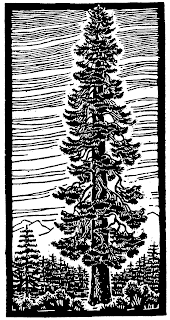
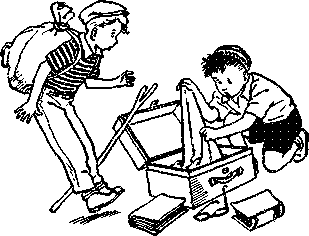
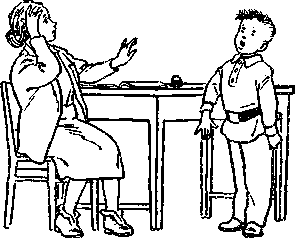
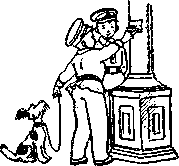




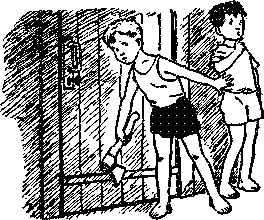

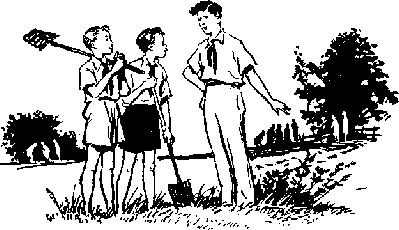
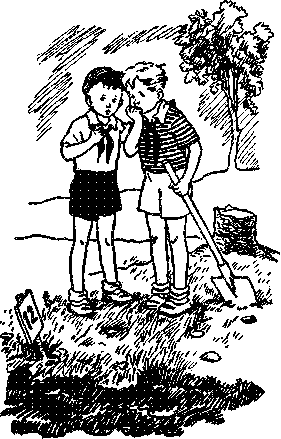
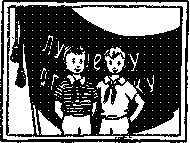
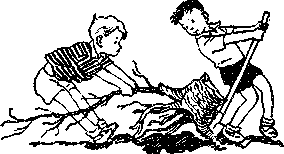
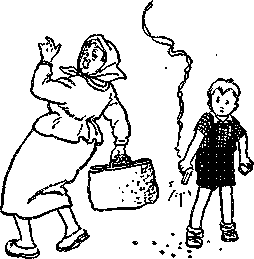 as brought up reading the stories, and generation of our parents was brought up on them and we tried to bring up our children by reading them good children book. Today we are finishing a story by Nikolay Nosov “The pistol”. If you did not read the first part please click at the little picture.
as brought up reading the stories, and generation of our parents was brought up on them and we tried to bring up our children by reading them good children book. Today we are finishing a story by Nikolay Nosov “The pistol”. If you did not read the first part please click at the little picture. 
